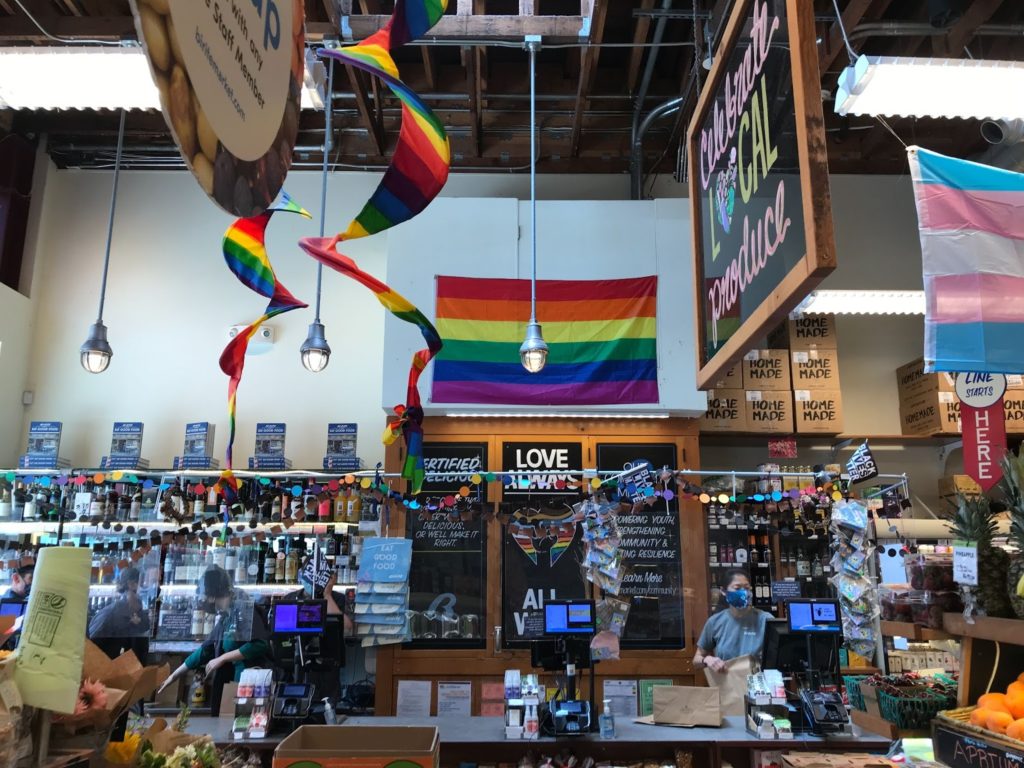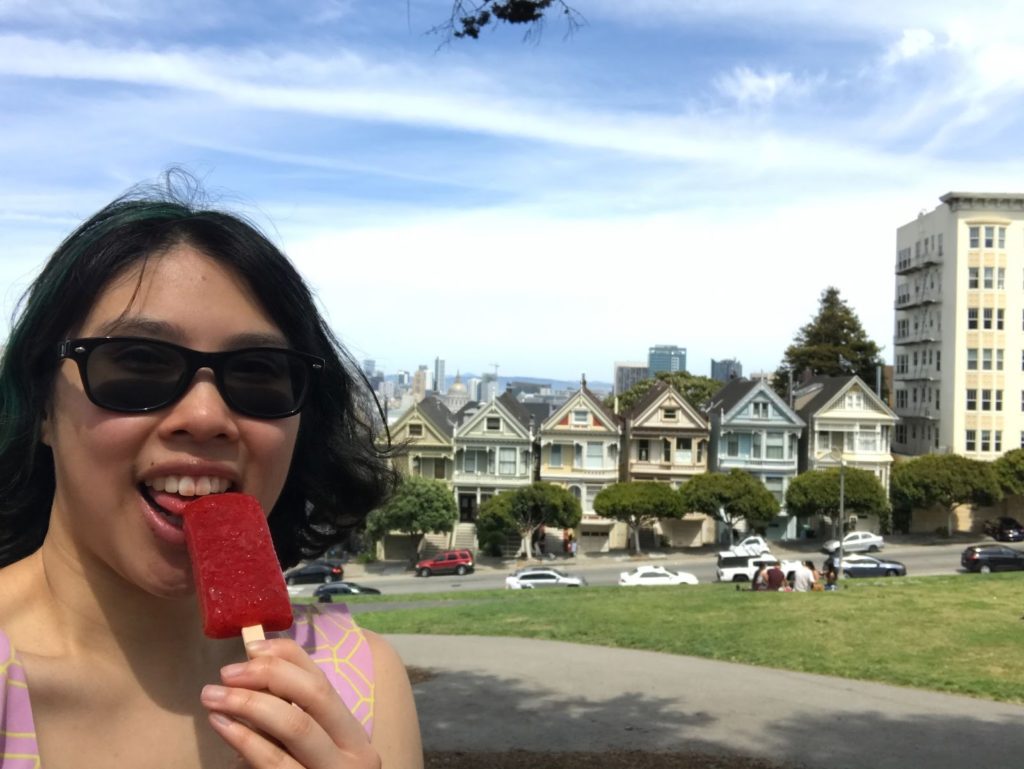by “Mindful” Meggie Tran, she/they
As I entered the beloved San Francisco-based grocery store chain, Bi-Rite, I took in the many colors coating the interior. Over the produce section, a transgender flag and twisty rainbow streamers proudly hung over. Signs posted around the store reminded its patrons that all identities were welcome and safe in Bi-Rite stores.
If I had missed any of these pride decorations, the checkout counter would certainly drive their support of queerness. A large rainbow flag was tacked above the upper wall. A “LOVE ALWAYS” blackboard stood behind the cashier. A poster on the glass shield protecting the cashier reminded customers to call people by their first names or gender-neutral pronouns so as to not assume identities.

Nothing about this place was performative. People could express themselves however they wanted. When my cashier handed me back my red strawberry-lemonade popsicle with a gentle, friendly smile over their beard, I noticed that they had light blue fingernail polish.
Bi-Rite was one of many places around San Francisco where I was accepted for my queer identity. It left me yearning for other cities in the United States and the world to be as open to non-heterosexuals as San Francisco.
Shopping at Bi-Rite unleashed my queer pride and helped me understand myself even more. The day after shopping at Bi-Rite, as I’m writing this article, I’ve changed my pronouns from she/her to she/they. I feel much more like myself now!
For a few years, I’ve identified as an asexual (“ace,” for short). I first learned about asexuality in my late teens when my college freshman psychology class briefly touched on the various sexual identities. As my professor described asexuality, I identified closely with it. But then, a few classmates laughed and scoffed at the mini-lecture. I read their disbelieving faces and chuckles as, How could some people possibly not feel sexual attraction?
Hello! I’m right here. I felt hurt, and rejected as a person, as if they thought my sexual identity was illegitimate. A joke.

But however they may poke fun at it, I know I’ve been ace all along.
Whenever my high school and college friends talked about dating and crushes, I was a real good listener because I didn’t have anything to share. Whenever they asked me about my sex life, I steered the conversation somewhere else. I don’t have one!
Sometimes, a boy asked me out on a date or took a liking to me. Many of my female friends would be stoked to have these things happen to them. But I wished it wouldn’t ever happen to me. It felt awkward and unnatural. It was cool by me to know these boys through friendships, but not beyond, where sexual desire — something I didn’t have — is expected. Whenever I would let a boy know directly or indirectly that I wasn’t interested in relationships, they didn’t even attempt to feed energy into our friendships. I was sad that this happened, but I accepted it.
I still love people, just not sexually. My destiny as an asexual person is to seek out platonic intimacy, which leads to strong friendships with both straight and queer folks.
When one of my high school friends, Devon, announced on social media that she was ace, for the first time, I felt an overwhelming solidarity. I could relate to someone else’s sexual identity! We talked nonstop about our ace pride — and her grievances. I learned that asexuality is a disregarded queer identity. Some people thought the “A” in “LGBTQIA+” stands for “ally.” Many of her coworkers — even a gay one — never knew about asexuality as a sexual identity. Some people in her life didn’t even consider ace people as part of the queer community.
Ever since Devon opened up and I recognized the sordid lack of ace understanding, I, too, have been publicly open about being ace.
Before I recognized that I was ace, I had already suffered from unwanted sexual OCD thoughts (this was before I was diagnosed with OCD and received therapeutic treatment). In my technical high school’s computer classes, I was often the only female. My OCD started using the environment (surrounded by boys) and my asexuality (not desiring sex) to trigger obsessive thoughts. When I sat at my computer workstation and a boy walked past me, I repeatedly worried that we had sexual contact and that I was a victim of rape. The following compulsion made me stare down at my pants several times, making sure they were still pulled up and the zipper was shut.
I was one confused, anxiety-ridden high schooler. It was only when I got diagnosed with OCD a year after my high school graduation and learned about asexuality in college that I understood how my obsessive thoughts in my technical high school came about. I don’t remember if I had such thoughts after I graduated from that school. If they did return, I must have used my cognitive-behavioral therapy to be aware of my OCD thoughts and prevent them from running my life.

I’ve grown and learned so much by going beyond my comfort zone in the real world. On the top floor of an apartment building, I’m looking over the San Francisco cityscape with fondness as I wrap this up. I think of my travels, wandering aimlessly around San Francisco, watching the rainbow spill into the streets and the queer folks carrying on with their everyday lives.
More than ever, I am proud to be an ace who identifies as she/they. When declaring to my public circle that I am ace, I’ve realized that it can take a lot of explanation. Some think this work is tiring, but I’m just glad that people are willing to learn about this underrepresented sexual identity.
I’ve also been public about my OCD through my travel and mental health blog, Mindful Meggie, where my mission is to destigmatize mental illnesses through travel. It is vulnerable work to describe my OCD thoughts and behaviors, but I must do so if I want our society to better empathize with folks who have OCD, which is still one of the most misunderstood mental illnesses.
Voicing for OCD education is a golden opportunity to show off my queerness and ace pride, too!
Meggie Tran (she/they) is a Vietnamese American traveler and mental health advocate with OCD and social anxiety who destigmatizes mental illnesses through travel. They share funny and inspiring travel stories as well as resources to make travel more accessible to people with mental health considerations on their blog, Mindful Meggie. You can follow them on Instagram, Facebook, Twitter, Pinterest, and YouTube.

Thank you for this very informative essay and memoir of your life as an asexual, ace, person. I now see this ace being- ness as a distinct category. I had not realized. Funny, I thought my 80 year old Asian American friend was “odd” when she told me something similar about herself, but now it seems natural and, more importantly, I don’t worry that she is lonely because she never married. (I am a female married to a male.) I am living with OCD, too.
Meggie, I wish you every happiness in a long life!
thank you so much for sharing your story! as an aroace person who gets really bad intrusive thoughts about romantic and sexual attraction, i really needed this!